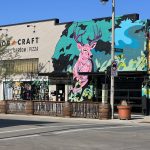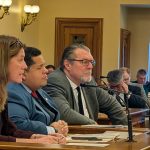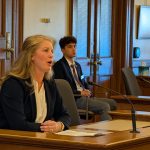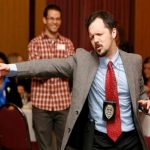Helping students reach their true potential
To complete this series on the multi-layered subject of arts in education (and the increasing lack thereof), I’ve invited Ralph Janes, a teacher at Milwaukee High School of the Arts and also the chair of its Theatre Department, to chat with me on this podcast.
Janes has felt the effects of budget cuts on public schools and art programs in particular, but has also witnessed firsthand the ways in which the arts can truly benefit students.
“Art challenges the status quo…and helps create thinking, autonomous human beings,” says Janes. “If you have a student study the arts on any level, they are more likely to do well in every subject they study.”
Janes notes that in the past, Milwaukee High School of the Arts received slightly more funding due to its designation as a magnet school. However, the school is currently financed at the same rate as other MPS schools, and cuts are slowly excising many of its programs — threatening MHSA’s reputation as an arts-focused school. Is an “arts school” really so if there are very few arts programs left? When there is little money left to fund specialized programs — whether they be in the arts, technology, etc.,– what effect does that have on the school and its students?
But beyond budgets and cutbacks, Janes explains how growing misconceptions about the arts — that programs like dance, music or theatre are superfluous to education — are just as troublesome.
Listen now:
(Windows Media Player)
(Quicktime)
Subscribe to Backstage with Mark Metcalf through iTunes here.
Theater
-
Oh, Those Witty 18th Century Brits
 Nov 24th, 2025 by Dominique Paul Noth
Nov 24th, 2025 by Dominique Paul Noth
-
Skylight’s Holiday Show Is Lots of Fun
 Nov 16th, 2025 by Dominique Paul Noth
Nov 16th, 2025 by Dominique Paul Noth
-
Rep’s ‘Come From Away’ Is a Triumph
 Nov 10th, 2025 by Dominique Paul Noth
Nov 10th, 2025 by Dominique Paul Noth























As a former Theatre Department Chair with MPS, I can tell you that theatre is vital for these students. Nobody really invents things for theater, theater begs, borrows, and steals from all of the other disciplines and having the students make connections between their Sociology, History, Science, Math, and Theatre classes was wonderful to behold. When they made those connections through art, where these discilines all came together, they “got it”. They understood. They could explain why these events happened and not just that they happened.